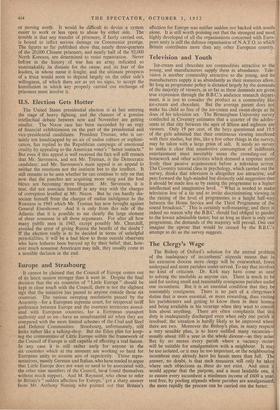The Clergy's Wage
The Bishop of Oxford's solution for the eternal problem, of the inadequacy of incumbents' stipends means that in his extensive diocese more clergy will be overworked, fewer, underpaid and more parishes under-served. To say that involves; no kind of criticism. Dr. Kirk may have come as near to solving the insoluble as anyone can. There is much to 1301 said for uniting small and reasonably contiguous parishes under, one incumbent. But it is an essential condition that they bei reasonably contiguous. There is no part of a clergyman'si duties that is more essential, or more rewarding, than visiting his parishioners and getting to know them in their homeso and being available in his vicarage when they want to consul i him about anything. There are often complaints that thi duty is inadequately discharged even when only one parish i involved; the situation is hardly likely to be improved where there are two. Moreover the Bishop's plan, in many respect a very sensible plan, is to leave unfilled many vacancies-1; usually about 100 a year in the whole diocese—as they arise But by no means every parish where a vacancy occurs will be suitable for amalgamation with a neighbour. It mall) be too isolated, or it may be too important, or the neighbouring/ incumbent may already have his hands more than full. Thq: 11 answer, no doubt, is that such measures will only be take where such objections as these do not exist. And since i 0 would appear that the purpose, and a most laudable one, i 0 to ensure every incumbent a minimum income of £600 a yea41 rent free, by pooling stipends where parishes are amalgamated,,, the more rapidly the process can be carried out the better.


















































 Previous page
Previous page